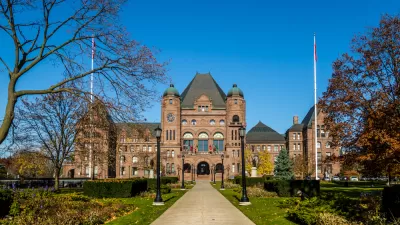Adopted in 2011 and implemented in 2012, the Australian carbon tax was repealed on July 16, 2014, taking with it plans to transform the tax into a cap and trade system linked to the EU's. Are there implications for other developed nations?
"On (July 16th), the Australian Senate voted 39-32 to repeal the nation's controversial tax on greenhouse-gas emissions.," writes Brad Plumer, senior editor for Vox. "The repeal is a big blow for climate policy. Economists have long argued that carbon pricing is one of the most effective ways to tackle global warming," he adds. In fact, "the power sector report(ed) a 9 percent drop (in emissions) in the first six months alone," Plumer notes.
Repeal wheels began rolling when Tony Abbott became Prime Minister in 2013. "Abbott and the Liberal Party made repeal of the carbon tax a major issue in the run-up to the 2013 elections," writes Plumer.
Abbott argued that the tax was costing the Australian economy some $9 billion per year and had little climate benefit so long as other countries weren't also enacting their own carbon taxes.
Australia, which relies heavily on coal burning for electricity generation, has one of the world's highest greenhouse gas emission per capita rates according to The Carbon Brief.
Australia had the highest per capita emissions in 2012 at 18.8 tonnes. In the US, emissions per capita were 16.4 tonnes, and just behind came oil-rich Saudi Arabia with per capita emissions of 16.2 tonnes.
With or without the carbon tax, the nation will stick to its emission targets reductions of "25 per cent by 2020 compared with 2000 levels."
However, without the "price supports" that come with the carbon tax, attainment is unlikely, according to carbon advisory firm RepuTex. Coal-generated electricity will rise and wind-generated power will stall.
Coal generation, we anticipate, will increase from around 74 per cent of all generation at the moment, through to 81 per cent by 2020...The lack of price support would likely make achieving the 20 per cent renewable energy target by 2020 unrealistic."
Timothy Cama, energy and environment reporter for The Hill, writes that what happens in Australia doesn't stay there - it represents a setback for climate activists in the U.S., according to both carbon tax supporters and opponents.
“I thought it was a good law, and it’s disappointing that they decided that rather than being a leader, they’d be a laggard, rather than deal with climate change,” said Rep. Henry Waxman (D-Calif.) who sponsored a carbon tax bill with Sen. Sheldon Whitehouse (D-R.I.) and others.
Sen. David Vitter (R-La.) said the vote shows not only an opposition to carbon taxes, but a general distaste for other government policies that seek to curb carbon emissions. He said the decision should force carbon-tax supporters to be more cautious.
According to The Wall Street Journal, the move is unprecedented: no other developed nation has repealed a carbon tax. Rob Taylor and Rhiannon Hoyle write that the repeal "could highlight the difficulty in implementing additional measures to reduce carbon emissions ahead of global climate talks next year in Paris."
Correspondent's note: Access to Wall Street Journal article should be available for non-subscribers through July 27.
FULL STORY: Australia is repealing its controversial carbon tax

Maui's Vacation Rental Debate Turns Ugly
Verbal attacks, misinformation campaigns and fistfights plague a high-stakes debate to convert thousands of vacation rentals into long-term housing.

Planetizen Federal Action Tracker
A weekly monitor of how Trump’s orders and actions are impacting planners and planning in America.

San Francisco Suspends Traffic Calming Amidst Record Deaths
Citing “a challenging fiscal landscape,” the city will cease the program on the heels of 42 traffic deaths, including 24 pedestrians.

Defunct Pittsburgh Power Plant to Become Residential Tower
A decommissioned steam heat plant will be redeveloped into almost 100 affordable housing units.

Trump Prompts Restructuring of Transportation Research Board in “Unprecedented Overreach”
The TRB has eliminated more than half of its committees including those focused on climate, equity, and cities.

Amtrak Rolls Out New Orleans to Alabama “Mardi Gras” Train
The new service will operate morning and evening departures between Mobile and New Orleans.
Urban Design for Planners 1: Software Tools
This six-course series explores essential urban design concepts using open source software and equips planners with the tools they need to participate fully in the urban design process.
Planning for Universal Design
Learn the tools for implementing Universal Design in planning regulations.
Heyer Gruel & Associates PA
JM Goldson LLC
Custer County Colorado
City of Camden Redevelopment Agency
City of Astoria
Transportation Research & Education Center (TREC) at Portland State University
Jefferson Parish Government
Camden Redevelopment Agency
City of Claremont





























